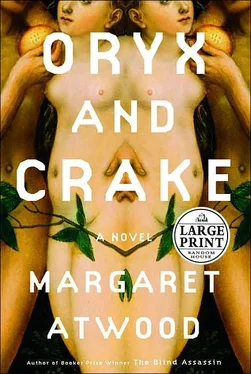Ramona would always have a salad. “How’s Sharon doing?” she would say to Jimmy’s father, looking at him with her eyes wide and solemn. Sharon was Jimmy’s mother.
“Not so hot,” Jimmy’s father would say.
“Oh, that’s too bad.”
“It’s a problem. I’m getting worried.”
Jimmy watched Ramona eat. She took very small bites, and managed to chew up the lettuce without crunching. The raw carrots too. That was amazing, as if she could liquefy those hard, crisp foods and suck them into herself, like an alien mosquito creature on DVD.
“Maybe she should, I don’t know, see someone?” Ramona’s eyebrows lifted in concern. She had mauve powder on her eyelids, a little too much; it made them crinkly. “They can do all sorts of things, there’s so many new pills…” Ramona was supposed to be a tech genius but she talked like a shower-gel babe in an ad. She wasn’t stupid, said Jimmy’s dad, she just didn’t want to put her neuron power into long sentences. There were a lot of people like that at OrganInc, and not all of them were women. It was because they were numbers people, not word people, said Jimmy’s father. Jimmy already knew that he himself was not a numbers person.
“Don’t think I haven’t suggested it, I asked around, found the top guy, made the appointment, but she wouldn’t go,” said Jimmy’s father, looking down at the table. “She’s got her own ideas.”
“It’s such a shame, a waste. I mean, she was so smart!”
“Oh, she’s still smart enough,” said Jimmy’s father. “She’s got smart coming out of her ears.”
“But she used to be so, you know…”
Ramona’s fork would slide out of her fingers, and the two of them would stare at each other as if searching for the perfect adjective to describe what Jimmy’s mother used to be. Then they’d notice Jimmy listening, and beam their attention down on him like extraterrestrial rays. Way too bright.
“So, Jimmy sweetheart, how’s it going at school?”
“Eat up, old buddy, eat the crusts, put some hair on your chest!”
“Can I go look at the pigoons?” Jimmy would say.
The pigoons were much bigger and fatter than ordinary pigs, to leave room for all of the extra organs. They were kept in special buildings, heavily secured: the kidnapping of a pigoon and its finely honed genetic material by a rival outfit would have been a disaster. When Jimmy went in to visit the pigoons he had to put on a biosuit that was too big for him, and wear a face mask, and wash his hands first with disinfectant soap. He especially liked the small pigoons, twelve to a sow and lined up in a row, guzzling milk. Pigoonlets. They were cute. But the adults were slightly frightening, with their runny noses and tiny, white-lashed pink eyes. They glanced up at him as if they saw him, really saw him, and might have plans for him later.
“Pigoon, balloon, pigoon, balloon,” he would chant to pacify them, hanging over the edge of the pen. Right after the pens had been washed out they didn’t smell too bad. He was glad he didn’t live in a pen, where he’d have to lie around in poop and pee. The pigoons had no toilets and did it anywhere; this caused him a vague sensation of shame. But he hadn’t wet his bed for a long time, or he didn’t think he had.
“Don’t fall in,” said his father. “They’ll eat you up in a minute.”
“No they won’t,” said Jimmy. Because I’m their friend, he thought. Because I sing to them. He wished he had a long stick, so he could poke them—not to hurt them, just to make them run around. They spent far too much time doing nothing.
When Jimmy was really little they’d lived in a Cape Cod—style frame house in one of the Modules—there were pictures of him, in a carry-cot on the porch, with dates and everything, stuck into a photo album at some time when his mother was still bothering—but now they lived in a large Georgian centre-plan with an indoor swimming pool and a small gym. The furniture in it was called reproduction . Jimmy was quite old before he realized what this word meant—that for each reproduction item, there was supposed to be an original somewhere. Or there had been once. Or something.
The house, the pool, the furniture—all belonged to the OrganInc Compound, where the top people lived. Increasingly, the middle-range execs and the junior scientists lived there too. Jimmy’s father said it was better that way, because nobody had to commute to work from the Modules. Despite the sterile transport corridors and the high-speed bullet trains, there was always a risk when you went through the city.
Jimmy had never been to the city. He’d only seen it on TV—endless billboards and neon signs and stretches of buildings, tall and short; endless dingy-looking streets, countless vehicles of all kinds, some of them with clouds of smoke coming out the back; thousands of people, hurrying, cheering, rioting. There were other cities too, near and far; some had better neighbourhoods in them, said his father, almost like the Compounds, with high walls around the houses, but those didn’t get on TV much.
Compound people didn’t go to the cities unless they had to, and then never alone. They called the cities the pleeblands . Despite the fingerprint identity cards now carried by everyone, public security in the pleeblands was leaky: there were people cruising around in those places who could forge anything and who might be anybody, not to mention the loose change—the addicts, the muggers, the paupers, the crazies. So it was best for everyone at OrganInc Farms to live all in one place, with foolproof procedures.
Outside the OrganInc walls and gates and searchlights, things were unpredictable. Inside, they were the way it used to be when Jimmy’s father was a kid, before things got so serious, or that’s what Jimmy’s father said. Jimmy’s mother said it was all artificial, it was just a theme park and you could never bring the old ways back, but Jimmy’s father said why knock it? You could walk around without fear, couldn’t you? Go for a bike ride, sit at a sidewalk café, buy an ice-cream cone? Jimmy knew his father was right, because he himself had done all of these things.
Still, the CorpSeCorps men—the ones Jimmy’s father called our people —these men had to be on constant alert. When there was so much at stake, there was no telling what the other side might resort to. The other side, or the other sides: it wasn’t just one other side you had to watch out for. Other companies, other countries, various factions and plotters. There was too much hardware around, said Jimmy’s father. Too much hardware, too much software, too many hostile bioforms, too many weapons of every kind. And too much envy and fanaticism and bad faith.
Long ago, in the days of knights and dragons, the kings and dukes had lived in castles, with high walls and drawbridges and slots on the ramparts so you could pour hot pitch on your enemies, said Jimmy’s father, and the Compounds were the same idea. Castles were for keeping you and your buddies nice and safe inside, and for keeping everybody else outside.
“So are we the kings and dukes?” asked Jimmy.
“Oh, absolutely,” said his father, laughing.
At one time Jimmy’s mother had worked for OrganInc Farms. That was how his mother had met his father: they’d both worked at the same Compound, on the same project. His mother was a microbiologist: it had been her job to study the proteins of the bioforms unhealthy to pigoons, and to modify their receptors in such a way that they could not bond with the receptors on pigoon cells, or else to develop drugs that would act as blockers.
“It’s very simple,” she said to Jimmy in one of her explaining moods. “The bad microbes and viruses want to get in through the cell doors and eat up the pigoons from the inside. Mummy’s job was to make locks for the doors.” On her computer screen she showed Jimmy pictures of the cells, pictures of the microbes, pictures of the microbes getting into the cells and infecting them and bursting them open, close-up pictures of the proteins, pictures of the drugs she had once tested. The pictures looked like the candy bins at the supermarket: a clear plastic bin of round candies, a clear plastic bin of jelly beans, a clear plastic bin of long licorice twizzles. The cells were like the clear plastic bins, with the lids you could lift up.
Читать дальше












